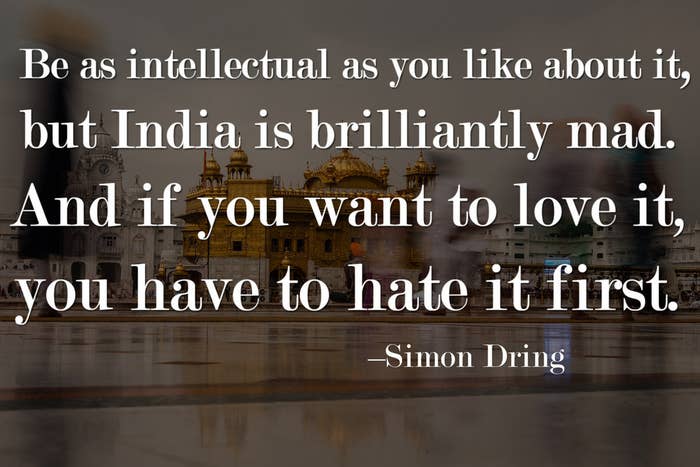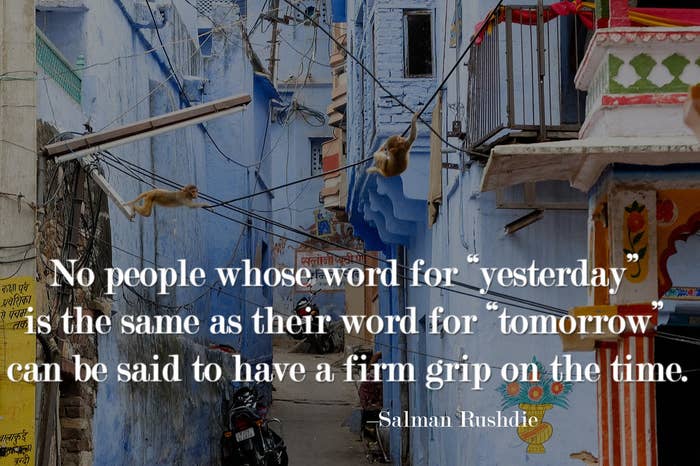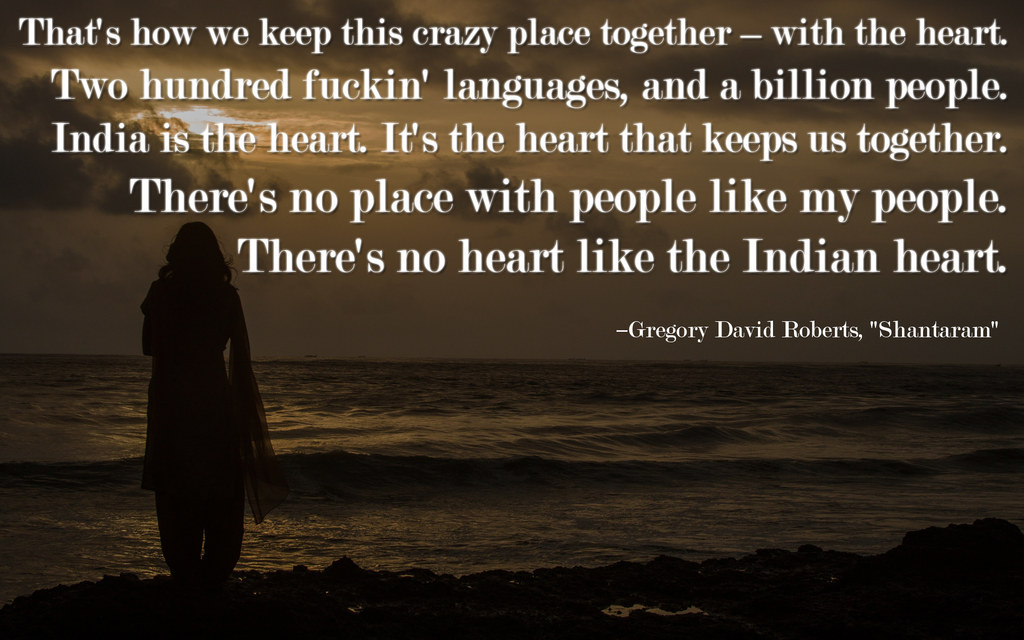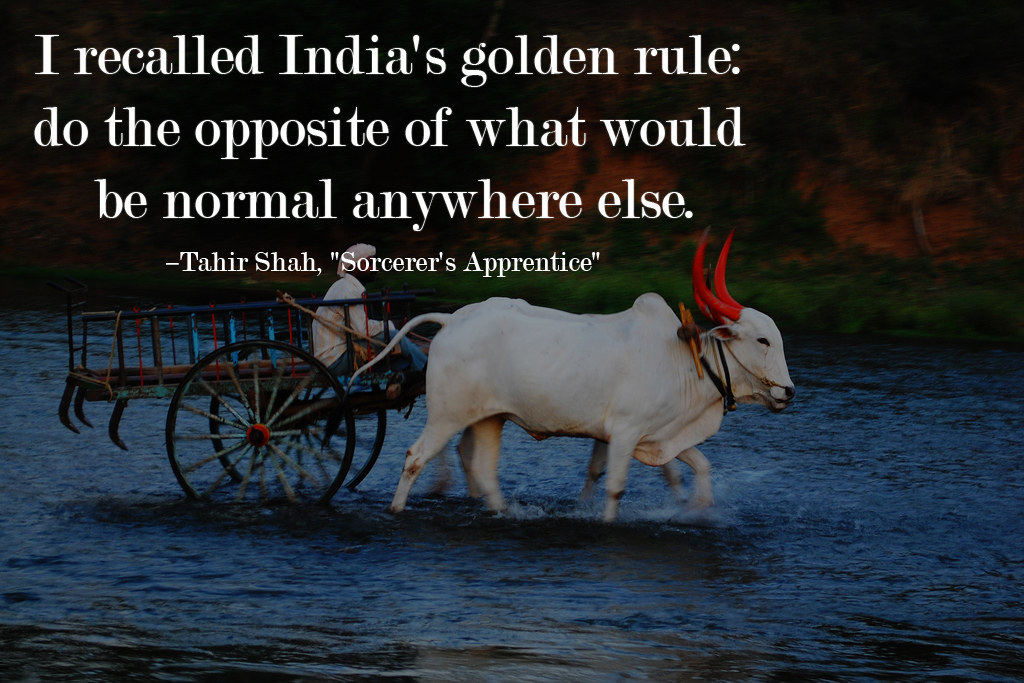
2. "In India even the most mundane inquiries have a habit of ending this way. There may be two answers, there may be five, a dozen or a hundred; the only thing that is certain is that all will be different."
―Eric Newby, "Slowly Down the Ganges"
3. "India, the new myth – a collective fiction in which anything was possible, a fable rivalled only by the two other mighty fantasies: money and God."
―Salman Rushdie, "Midnight's Children"
4. "Becoming attached to a country involves pressing, uncomfortable questions about justice and opportunity for its least powerful citizens."
― Katherine Boo, "Behind the Beautiful Forevers: Life, Death, and Hope in a Mumbai Undercity"
5. "How can the mind take hold of such a country? Generations of invaders have tried, but they remain in exile. The important towns they build are only retreats, their quarrels the malaise of men who cannot find their way home. India knows of their trouble. She knows of the whole world's trouble, to its uttermost depth. She calls "Come" through her hundred mouths, through objects ridiculous and august. But come to what? She has never defined. She is not a promise, only an appeal."
― E.M. Forster, "A Passage to India"

7. "India, she now knew, would not be content staying in the background, was nobody's wallpaper, insisted in interjecting itself into everyone's life, meddling with it, twisting it, moulding it beyond recognition.
―Thrity Umrigar, "The Weight of Heaven"
8. "India, she had found out, was a place of political intrigue and economic corruption, a place occupied by real people with their incessantly human needs, desires, ambitions, and aspirations, and not the exotic, spiritual, mysterious entity that was a creation of the Western imagination."
―Thrity Umrigar, "The Weight of Heaven"
9. "No people whose word for 'yesterday' is the same as their wordf or 'tomorrow' can be said to have a firm grip on the time."
—Salman Rushdie, "Midnight's Children"
10. "Calcutta's the only city I know where you are actively encouraged to stop strangers at random for a quick chat."
―Tahir Shah, "Sorcerer's Apprentice"
11. "In India we're fighting to retain a wilderness that we have. Whereas in the west, it's gone. Every person that's walking down the street is a walking bar code. You can tell where their clothes are from, how much they cost, which designer made which shoe, which shop you bought each item from. Everything is civilized and tagged and valued and numbered and put in it's place. Whereas in India, the wilderness still exists-the unindoctrinated wilderness of the mind, full of untold secrets and wild imaginings."
―Arundhati Roy

13. "I listen to the sound of India's voices for the last time. Laughter ripples like water. A prayer is a single note held long. There is so much life here. And too much death. I feel a soft breeze caress my face and I look up. An orange ribbon is floating through the air. In India, it's easy to see the wind."
―Cathy Ostlere, "Karma"
14. "It is the intense spirituality of India, and not any great political structure or social organisation that it has developed, that has enabled it to resist the ravages of time and the accidents of history."
―Sarvepalli Radhakrishnan, "Indian Philosophy, Volume 1"
15. "In this city, every deserted street corner conceals a crowd. It appears in a minute when something disrupts the way in which the world is supposed to work. It can disappear almost as instantaneously."
―Jerry Pinto, "Em and The Big Hoom"
16. "There was too much opinion in this country, too many sob stories. Nobody wanted to put a lid on anything; everyone wanted to say it all, about everything. If you as much as said hello to someone on a train or a plane, you were in for the unexpurgated memoirs. Nehru in 1947 had declared us a nation finding utterance - but in fifty years the utterance had become a mad clamour, a crazed babble, an unending howl. We were a nation of Scheherzades, afraid we'd die if, for a moment, we shut up.
―Tarun J. Tejpal, "The Story Of My Assassins"
17. "Adventures do occur, but not punctually. Life rarely gives us what we want at the moment we consider appropriate."
―E.M. Forster, "A Passage to India"

19. "Indians are the Italians of Asia and vice versa. Every man in both countries is a singer when he is happy, and every woman is a dancer when she walks to the shop at the corner. For them, food is the music inside the body and music is the food inside the heart. Amore or Pyar makes every man a poet, a princess of peasant girl if only for second eyes of man and woman meets."
―Gregory David Roberts, "Shantaram"
20. "Now India is a place beyond all others where one must not take things too seriously—the midday sun always excepted."
―Rudyard Kipling, "Plain Tales from the Hills"
21. "India has known the innocence and insouciance of childhood, the passion and abandon of youth, and the ripe wisdom of maturity that comes from long experience of pain and pleasure; and over and over a gain she has renewed her childhood and youth and age"
―Jawaharlal Nehru, "The Discovery of India"
22. "India has always had a strange way with her conquerors. In defeat, she beckons them in, then slowly seduces, assimilates and transforms them."
―William Dalrymple, "White Mughals: Love and Betrayal in Eighteenth-Century India"
23. "So India's problem turns out to be the world's problem. What happened in India has happened in God's name. The problem's name is God."
―Salman Rushdie, "Satanic Verses"
24. "Go to Old Delhi,and look at the way they keep chickens there in the market. Hundred of pale hens and brightly colored roosters, stuffed tightly into wire-mesh cages. They see the organs of their brothers lying around them.They know they are next, yet they cannot rebel. They do not try to get out of the coop. The very same thing is done with humans in this country."
―Aravind Adiga, "The White Tiger"

26. "India was full of iskeems that had gone awry. Agricultural iskeems, political iskeems, economic iskeems, educational iskeems, stop black money iskeems, attract white tourists iskeems, drinkable water iskeems, animal protection iskeems, women's welfare iskeems, nurture children iskeems, don't scan female foetus iskeems, privatization iskeems, medical iskeems, entertainment iskeems, old India iskeems and new India iskeems. We had mastered the art of nomenclature from the white man. Grand labels could disguise unforgivable things."
―Tarun J. Tejpal, "The Alchemy of Desire"
27. "We all have our patchwork ideas of India, our notions and opinions and prejudices–often fallacious and absurd–of this enormous, disparate country, which, as I take pleasure in reminding newcomers, bigger in population than all but its own continent: Asia. It is a place onto which foreigners have projected their own exotic fantasies and fears, their explanatory and simplifying schemata. And they never seem quite to make up their minds–as they swing from one extreme to the other–whether this country is of great wealth or of appalling poverty, of spiritual renunciation or of unabashed materialism, of fasting or of gluttony, of erotic sophistication or of sexual puritanism, of corruption or of moral superiority. They probably fail to admit that it might be all these things, and even more so, everything in between."
―Sam Miller, "A Strange Kind of Paradise: India Through Foreign Eyes"
28. "As a romantic ideal, turbulent, impoverished India could still weave its spell, and the key to it all - the colours, the moods, the scents, the subtle, mysterious light, the poetry, the heightened expectations, the kind of beauty that made your heart miss a beat – well, that remained the monsoon."
―Alexander Frater, "Chasing the Monsoon"
29. "I am a Dalit in Khairlanji. A Pandit in the Kashmir valley. A Sikh in 1984. I am from the North East of India when I am in Munirka. I am a Muslim in Gujarat; a Christian in Kandhamal. A Bihari in Maharashtra. A Delhi-wallah in Chennai. A woman in North India. A Hindi-speaker in Assam. A Tamilian in MP. A villager in a big city. A confused man in an indifferent world. We're all minorities. We all suffer; we all face discrimination. It is only us resisting this parochialism when in the position of majoritarian power that makes us human. I hope that one day, I can just be an Indian in India – only then can I be me."
―Sami Ahmad Khan, "Red Jihad"
